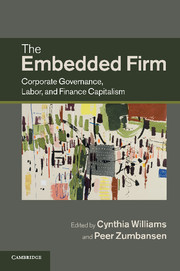Book contents
- Frontmatter
- Contents
- Figures
- Tables
- Contributors
- 1 Introduction: corporate governance after the ‘end of history’
- Part I Historical trajectories of business and regulation
- 2 Corporate governance and financial crisis in the long run
- 3 Financialism
- 4 Legitimating power
- 5 Engaging corporate boards
- 6 The primacy of Delaware and the embeddedness of the firm
- 7 The new embeddedness of the corporation
- Part II New interests, new shareholder constellations, new landscapes
- Part III Labor’s evolution in the new economy
- Part IV The transnational embedded firm and the financial crisis
- Part V Conclusion
- Index
- References
4 - Legitimating power
the changing status of the board of directors
from Part I - Historical trajectories of business and regulation
Published online by Cambridge University Press: 07 September 2011
- Frontmatter
- Contents
- Figures
- Tables
- Contributors
- 1 Introduction: corporate governance after the ‘end of history’
- Part I Historical trajectories of business and regulation
- 2 Corporate governance and financial crisis in the long run
- 3 Financialism
- 4 Legitimating power
- 5 Engaging corporate boards
- 6 The primacy of Delaware and the embeddedness of the firm
- 7 The new embeddedness of the corporation
- Part II New interests, new shareholder constellations, new landscapes
- Part III Labor’s evolution in the new economy
- Part IV The transnational embedded firm and the financial crisis
- Part V Conclusion
- Index
- References
Summary
Introduction
This chapter examines how in the course of the twentieth century the legal community turned from viewing directors as trustees for the community to seeing directors as agents of the shareholders. I argue that academic and judicial definitions of the appropriate status of directors were influenced by different understandings of the role of corporations in society. The early twentieth-century idea that directors were trustees was influenced by the Progressives’ concerns about the concentration of private and public power while the late twentieth-century description of directors as agents was influenced by market ideology. Interestingly, while grounded in entirely different worldviews, each assigned status helped legitimate directors’ power and limited, if any, liability. The idea that directors were trustees helped legitimate the powerful public corporation while the vision of directors as agents was used by courts to justify their deference to directors’ discretion and helped shield them from liability altogether.
The chapter begins with the rise of the giant public corporation during and after the merger wave of the late 1890s. Discussions of the status of the board at that time were situated in a broader public concern about corporate power and its potential abuse. Scholarly focus centered upon the power that the control group (typically controlling shareholders and investment banks) could exercise to manipulate stock prices and market transactions. Legal scholars, seeking to legitimate the large public corporation and its power while eliminating such abuses by the control group, turned their focus on directors; they wanted to vest directors with public power and public trust.
- Type
- Chapter
- Information
- The Embedded FirmCorporate Governance, Labor, and Finance Capitalism, pp. 60 - 81Publisher: Cambridge University PressPrint publication year: 2011
References
- 1
- Cited by



